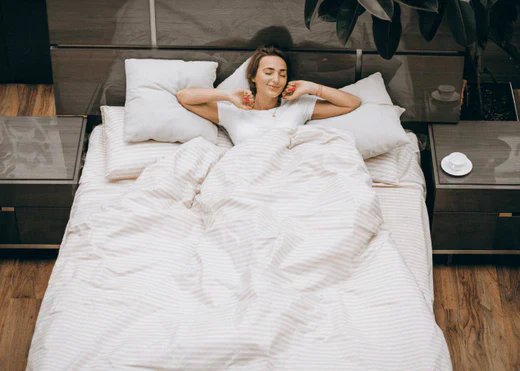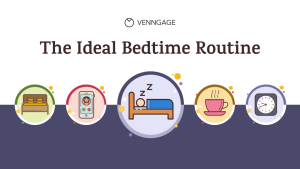Where you sleep is the first step to a good night’s sleep. Stress, food, and screen time are often cited as contributing factors to poor sleep. While these factors can certainly impact your sleep quality, your bedroom is the most important. From lighting and temperature to the layout of your room, small changes can make a big difference. The goal is to make your bedroom a calming space where your mind and body can relax naturally. This article discusses some simple and practical bedroom changes that can help you improve your sleep quality and wake up refreshed.
Tidying up your space is calming and uncluttered
Your bedroom should be a place of tranquility, not clutter. Clutter in your environment can increase your stress and overstimulation, making it difficult to rest. First, clear out areas like your nightstand and dresser of unnecessary items. Arrange your clothes, put away laundry, and ensure the area around your bed is clean and tidy. A tidy space signals to your brain that it’s time to relax, helping you fall asleep faster. If you find your room gets cluttered quickly, try minimalism, such as limiting the number of items, using soft colors, and creating a calming layout.
Invest in comfortable bedding
No matter how good your mattress, pillows, and sheets are, they can affect your sleep quality. A lumpy mattress or a pillow that’s too flat can cause neck pain and stiffness, disrupting your sleep. Choose a mattress that suits your sleeping style. A firm mattress is best for back sleepers; a firm to medium-firm mattress for side sleepers; and a soft mattress is optimal for stomach sleepers. To prevent overheating, choose sheets and pillows made of natural, soft materials, such as cotton or bamboo. Investing in high-quality bedding may feel like a luxury, but it’s actually an investment in your health and productivity.
Change the room temperature
Temperature is one of the most overlooked factors that affect your sleep. Most people feel most comfortable in their bedroom between 15°C and 19°C. A room that’s too warm can make you restless, while a room that’s too cold can wake you up at night. Turn up your thermostat and use well-ventilated furniture. Depending on the season, you can also use a fan or a light blanket. Adjusting the temperature slightly can help you sleep better and more peacefully.
Reduce light and noise
Light and noise are two factors that can disrupt your sleep. Even gentle sounds like traffic, ticking clocks, or dripping faucets can keep you awake. If you live in a noisy environment, try earplugs, a white noise machine, or a mix of soft, natural sounds. Without light, your body produces melatonin, a hormone that helps you fall asleep. Block out light with blackout curtains or a sleep mask. Keep bright alarm clocks and electronic devices that emit blue light away from your eyes.
Keep electronic devices out of the bedroom
Blue light from mobile phones, computers, and televisions is known to block melatonin production, making it harder to fall asleep. Besides light, social media and movies can also keep your mind occupied when you should be relaxing. Keep screens out of the bedroom at least 30 to 60 minutes before bed. Don’t leave your phone next to your bed while you sleep. Instead, set it to airplane mode and leave it on your desk. This simple rule can help your brain associate your room with rest and relaxation.
Choose calming colors and lighting
Colors can affect your alertness level depending on how you use them. Soft, soothing colors like light blue, purple, beige, or soft green can bring peace and tranquility. Avoid overly bright colors like orange or red, which can make you feel more alert and energetic. The same goes for lighting: bright overhead lights signal your brain that it’s daytime. Instead, use LED bulbs that mimic sunset hues or dimmable, warm-toned bedroom lamps. This creates a calm, sleep-promoting environment.
Add natural elements
Surrounding yourself with nature can help you find peace of mind. Plants in your bedroom not only purify the air but also reduce stress and anxiety. Choose low-maintenance houseplants like lilies, tigertail plants, or lavender. To create a calming and stable space, you can also use natural materials like wooden furniture, cotton curtains, and handmade rugs. These elements can help you feel calm and balanced, which can contribute to a better night’s sleep.
Air that is too dry can damage your throat and nose, while too much moisture can promote mold growth. Use a humidifier or dehumidifier to balance the humidity.
Personalize your bedroom
Your bedroom should reflect your personality and make you feel comfortable. Add items that bring you joy and peace, such as your favorite picture frame, a soft blanket, or calming scents like lavender or chamomile. Aromatherapy can be very helpful when it comes to sleep. When you use essential oils in a diffuser or pillow spray, they can signal your body that it’s time to rest. It’s important to create a space that feels safe and calm, a place where you feel your stress melt away the moment you enter.
Stick to a regular sleep schedule
A consistent sleep schedule tells your body when it’s time to rest. Try not to move things around in your bedroom or change the lighting too often. By becoming familiar with a space, you strengthen your connection to sleep. Over time, just entering your bedroom will make you feel calmer, making it easier to fall asleep. If you do this and maintain your normal sleep habits, you’ll sleep better at night and feel more alert in the morning.
Frequently Asked Questions
1. How important is a good mattress for a good night’s sleep?
A good mattress supports your spine and provides comfort, preventing you from tossing and turning. A good mattress is crucial for preventing back pain and sleeping better.
2. Does the color of your room really affect the quality of your sleep?
Yes. Soothing colors like blue, gray, and brown can help you feel calm. On the other hand, bright or flashy colors can make your brain more alert, making it harder to rest.
3. Can I sleep next to my phone?
Don’t leave your phone next to your bed. Even when you’re not using it, notifications or its blue light can prevent you from falling asleep.
4. How do plants help you sleep better?
Plants release oxygen, purify the air, and relieve stress – all of this creates a healthy, relaxing environment and promotes better sleep.
What are some affordable ways to make my bedroom more peaceful? You can make your room more relaxing inexpensively by getting rid of unnecessary items, adding plants, using soft lighting, and choosing soothing colors.
In short
Often, it’s the simplest changes that can help you sleep better, not expensive equipment or complicated routines. By keeping your bedroom calm, clean, and comfortable, you’re signaling to your body and mind that it’s time to rest. Every small change you make, like choosing a calming color or eliminating distractions, will bring you closer to the deep, restful sleep you need. Make your sleep space a top priority today, because a better night’s sleep means a happier, more productive day.




